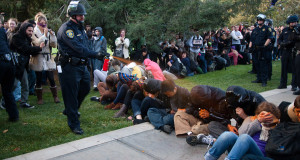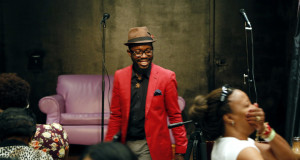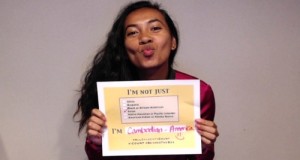This year the country marks the 50th anniversary of the passage of the Civil Rights Act. The landmark law prohibited discrimination based on race and gender and was the culmination of a decades-long struggle for equality as a part of the civil rights movement.
A major event in that struggle was the 1963 March on Washington. Today it is one of the most famous events in American history. On Aug. 27 that year, 250,000 people of all ages and races gathered in Washington from across the United States to call for equal rights. In the crowd was Karen Mulhauser, then a fourth-year student at Antioch College in Ohio.
“It’s one of those experiences that you have in your life that helps shape who you are,” she says, recalling the march. “Just to be there with all of those hundreds of thousands of other people and know that you were there for the same reasons was an incredibly powerful experience and one that let you know that you were going to work on these issues for the rest of your life, one way or another.”
She added: “I think the country did turn a corner, in part because D.C. was prepared for violence … and there wasn’t any. That was an important statement.”
After the march, Mulhauser returned to Antioch College, where her involvement and interest in civil rights grew. She remembers when the Civil Rights Act was passed on July 2, 1964. “It seemed like an important next step. … I probably thought that it was going to have more of an impact than it actually did,” she said.
According to Kevin McGruder, an assistant professor of history at Antioch College, the journey of the Civil Rights Act began with President John F. Kennedy in spring 1963. The March on Washington was an effort by the civil rights movement to show support for that bill. When Kennedy was assassinated that fall and Lyndon B. Johnson took office, one of his first acts as president was to call for a civil rights bill in honor of Kennedy’s memory. During his days in the Senate, Johnson was known as a dealmaker, but even with his leadership, it wasn’t a smooth road to get the bill passed. Much of the resistance to the bill came from Southern Democrats, and “the fact that women were included was really a strategy to kill the bill,” said McGruder. “The person that added it to the bill thought that that would result in it being killed.”
Despite the opposition, the bill passed, but its impact was not immediate. “It didn’t change overnight because … [segregation was a] cultural practice that had long traditions, but at least it gave people the weight of the law to challenge them,” McGruder added. “The force of the law was there for people to draw on.”
The Civil Rights Act was followed by another landmark law, the Voting Rights Act of 1965, which outlawed discrimination based on race in voter registration. Many of the issues that the Civil Rights and Voting Rights acts strove to resolve still exist today; Mulhauser points out that laws are being passed all across the country that are making it more difficult for people of color to vote. “A lot of the things that we were working for at that time, voting rights and so forth … we’re still working for them — they haven’t been fixed yet,” she said.
Coming back from the march, Mulhauser remembers, “you couldn’t help but feel different.” What was for her a growing interest in issues of civil liberties became a lifetime dedicated to social justice. For the past 50 years, Mulhauser’s work has centered on advocacy, particularly on the issue of gender inequality, bringing to light problems that voters must take to their representatives for change to happen.
Mulhauser is now the president and founder of Mulhauser and Associates, a consulting firm that primarily helps nonprofit organizations develop advocacy programs and campaigns to bring issues to Congress or take a stance on specific legislation. She is also the chair of the United Nations Association, a project of the United Nations Foundation. The United Nations Association works in chapters across the country to support the United Nations’ work, particularly on issues concerning women and children. Its role is to foster awareness of what the United Nations is doing, and galvanize support for its projects in Congress.
Mulhauser is also a founder and chair of the Advisory Council of the Women’s Information Network in Washington, D.C., founded to “create forums for women to consciously mentor other women” in the city. It has grown into a source for leadership development, advocacy and mentorship and provided a safe, cooperative environment for women working in the capital.
“I’m not sure if everyone would define this life as one that is a constant struggle for civil rights and social justice – but it seems that way to me,” she said.
This fall, the Library of Congress will open an exhibit,“The Civil Rights Act of 1964: A Long Struggle for Freedom,”which include more than 200 items and 70 audio-visual recordings illustrating the centuries of struggle for racial equality in the United States and the far-reaching impact of the law.
Mulhauser is glad that the struggles of the past are being remembered and taught to a new generation, but she thinks that drawing attention to this history through only an exhibit is not enough. “A good exhibit in the Library of Congress is a good start and if it gets good traditional and social media coverage, that helps, but I think it really needs serious grass-roots organizing,” she said. “If it’s only going to have an impact on the people who visit the Library of Congress, it’s not having a great enough impact.”
The civil rights movement has changed dramatically over the past 50 years. In that time, Mulhauser has seen the definition of civil rights and social justice evolve and include broader swaths of society. “There was a time when people thought that civil rights was just white and black and now … it’s gender and it’s sexual orientation, and just that humans should all be treated equally, whoever they are.”
Follow @Kikahiga on Twitter
 VOICES Publishing from the AAJA National Convention
VOICES Publishing from the AAJA National Convention






